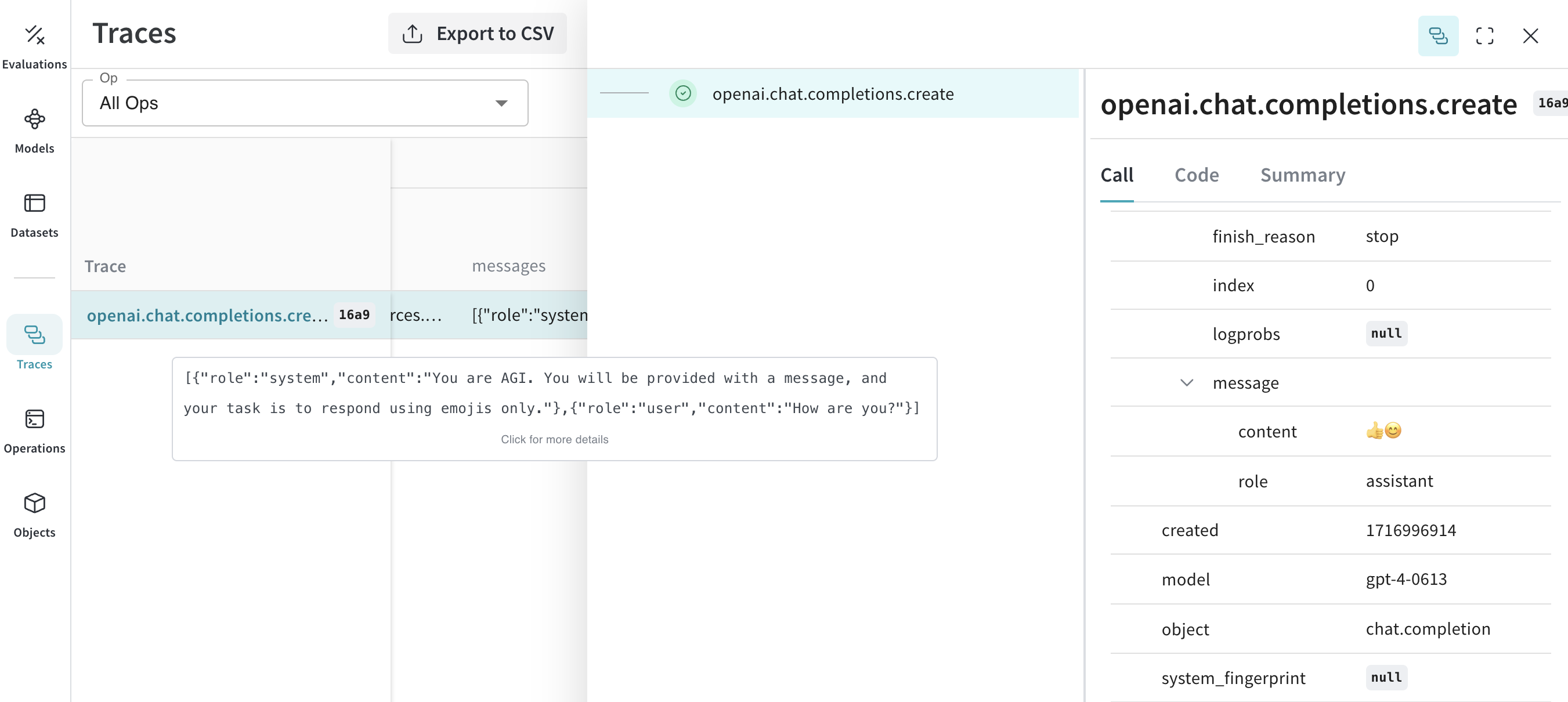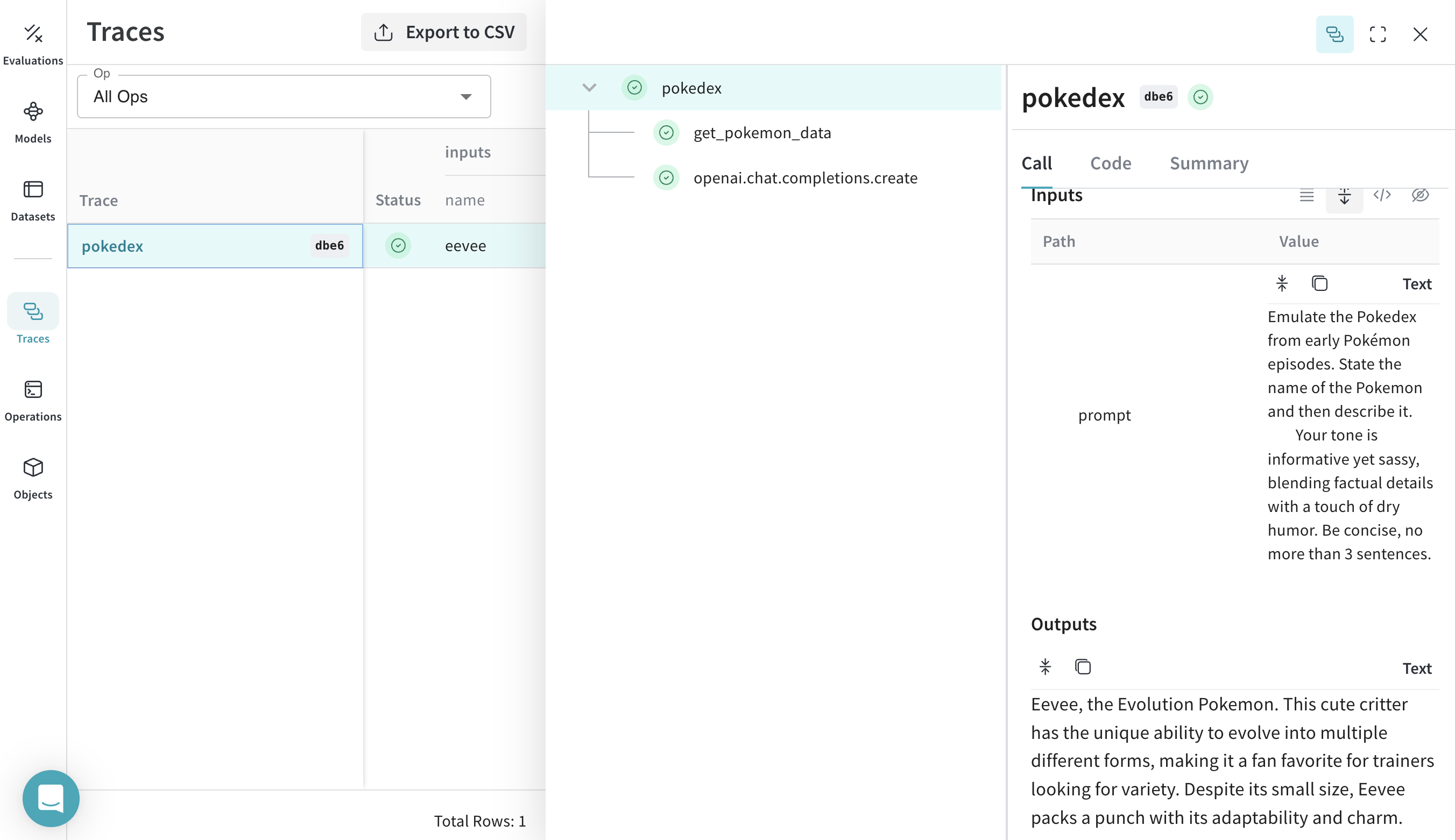OpenAI
Do you want to experiment with OpenAI models on Weave without any set up? Try the LLM Playground.
Tracing
It’s important to store traces of LLM applications in a central database, both during development and in production. You’ll use these traces for debugging and to help build a dataset of tricky examples to evaluate against while improving your application.
- Python
- TypeScript
Weave can automatically capture traces for the openai python library.
Start capturing by calling weave.init(<project-name>) with a project name of your choice. OpenAI will be automatically patched regardless of when you import it.
Automatic Patching
Weave automatically patches OpenAI whether imported before or after weave.init():
from openai import OpenAI
import weave
weave.init('emoji-bot') # OpenAI is automatically patched!
client = OpenAI()
response = client.chat.completions.create(
model="gpt-4",
messages=[
{"role": "user", "content": "Make me a emoji"}
]
)
Explicit Patching (Optional) You can still explicitly patch if you want fine-grained control:
import weave
weave.init('emoji-bot')
weave.integrations.patch_openai() # Enable OpenAI tracing
from openai import OpenAI
client = OpenAI()
response = client.chat.completions.create(
model="gpt-4",
messages=[
{
"role": "system",
"content": "You are AGI. You will be provided with a message, and your task is to respond using emojis only."
},
{
"role": "user",
"content": "How are you?"
}
],
temperature=0.8,
max_tokens=64,
top_p=1
)
Weave can automatically capture traces for the openai typescript library.
Start capturing by calling await weave.init(<project-name>) with a project name of your choice. If you don't specify a W&B team when you call `weave.init()`, your default entity is used. To find or update your default entity, refer to [User Settings](https://docs.wandb.ai/guides/models/app/settings-page/user-settings/#default-team) in the W&B Models documentation. This example specifies the emoji-bot project.
As of PR #4554, supported libraries such as OpenAI are automatically patched when Weave is loaded. You no longer need to manually wrap them, as was the case previously:
weave.wrapOpenAI(new OpenAI());
For more information, see the JS integration guide.
import {OpenAI} from 'openai';
import * as weave from 'weave';
const client = await weave.init('emoji-bot');
const openai = new OpenAI();
const response = await openai.chat.completions.create({
model: 'gpt-4',
messages: [
{
role: 'system',
content:
'You are AGI. You will be provided with a message, and your task is to respond using emojis only.',
},
{
role: 'user',
content: 'How are you?',
},
],
temperature: 0.8,
max_tokens: 64,
top_p: 1,
});
Track your own ops
- Python
- TypeScript
Wrapping a function with @weave.op starts capturing inputs, outputs and app logic so you can debug how data flows through your app. You can deeply nest ops and build a tree of functions that you want to track. This also starts automatically versioning code as you experiment to capture ad-hoc details that haven't been committed to git.
Simply create a function decorated with @weave.op that calls into openai python library.
In the example below, we have 2 functions wrapped with op. This helps us see how intermediate steps, like the retrieval step in a RAG app, are affecting how our app behaves.
import weave
from openai import OpenAI
import requests, random
PROMPT="""Emulate the Pokedex from early Pokémon episodes. State the name of the Pokemon and then describe it.
Your tone is informative yet sassy, blending factual details with a touch of dry humor. Be concise, no more than 3 sentences. """
POKEMON = ['pikachu', 'charmander', 'squirtle', 'bulbasaur', 'jigglypuff', 'meowth', 'eevee']
client = OpenAI()
@weave.op
def get_pokemon_data(pokemon_name):
# This is a step within your application, like the retrieval step within a RAG app
url = f"https://pokeapi.co/api/v2/pokemon/{pokemon_name}"
response = requests.get(url)
if response.status_code == 200:
data = response.json()
name = data["name"]
types = [t["type"]["name"] for t in data["types"]]
species_url = data["species"]["url"]
species_response = requests.get(species_url)
evolved_from = "Unknown"
if species_response.status_code == 200:
species_data = species_response.json()
if species_data["evolves_from_species"]:
evolved_from = species_data["evolves_from_species"]["name"]
return {"name": name, "types": types, "evolved_from": evolved_from}
else:
return None
@weave.op
def pokedex(name: str, prompt: str) -> str:
# This is your root op that calls out to other ops
data = get_pokemon_data(name)
if not data: return "Error: Unable to fetch data"
response = client.chat.completions.create(
model="gpt-3.5-turbo",
messages=[
{"role": "system","content": prompt},
{"role": "user", "content": str(data)}
],
temperature=0.7,
max_tokens=100,
top_p=1
)
return response.choices[0].message.content
weave.init('pokedex-openai')
# Get data for a specific Pokémon
pokemon_data = pokedex(random.choice(POKEMON), PROMPT)
Navigate to Weave and you can click get_pokemon_data in the UI to see the inputs & outputs of that step.
Wrapping a function with weave.op starts capturing inputs, outputs and app logic so you can debug how data flows through your app. You can deeply nest ops and build a tree of functions that you want to track. This also starts automatically versioning code as you experiment to capture ad-hoc details that haven't been committed to git.
Simply create a function wrapped with weave.op that calls into openai typescript library.
In the example below, we have 2 functions wrapped with op. This helps us see how intermediate steps, like the retrieval step within a RAG app, are affecting how our app behaves.
import OpenAI from 'openai';
import * as weave from 'weave';
const PROMPT = `Emulate the Pokedex from early Pokémon episodes. State the name of the Pokemon and then describe it.
Your tone is informative yet sassy, blending factual details with a touch of dry humor. Be concise, no more than 3 sentences.`;
const POKEMON = [
'pikachu',
'charmander',
'squirtle',
'bulbasaur',
'jigglypuff',
'meowth',
'eevee',
];
const openai = new OpenAI();
interface PokemonData {
name: string;
types: string[];
evolved_from: string;
}
const getPokemonData = weave.op(async function getPokemonData(
pokemonName: string
): Promise<PokemonData | null> {
try {
const url = `https://pokeapi.co/api/v2/pokemon/${pokemonName}`;
const response = await fetch(url);
if (response.ok) {
const data = await response.json();
const name = data.name;
const types = data.types.map((t: any) => t.type.name);
const speciesResponse = await fetch(data.species.url);
let evolved_from = 'Unknown';
if (speciesResponse.ok) {
const speciesData = await speciesResponse.json();
if (speciesData.evolves_from_species) {
evolved_from = speciesData.evolves_from_species.name;
}
}
return {name, types, evolved_from};
}
return null;
} catch (error) {
return null;
}
});
const pokedex = weave.op(async function pokedex(
name: string,
prompt: string
): Promise<string> {
const data = await getPokemonData(name);
if (!data) return 'Error: Unable to fetch data';
const response = await openai.chat.completions.create({
model: 'gpt-3.5-turbo',
messages: [
{role: 'system', content: prompt},
{role: 'user', content: JSON.stringify(data)},
],
temperature: 0.7,
max_tokens: 100,
top_p: 1,
});
return response.choices[0].message.content || '';
});
async function main() {
await weave.init('pokedex-openai');
const randomPokemon = POKEMON[Math.floor(Math.random() * POKEMON.length)];
const pokemonData = await pokedex(randomPokemon, PROMPT);
console.log(pokemonData);
}
main();
Create a Model for easier experimentation
- Python
- TypeScript
Organizing experimentation is difficult when there are many moving pieces. By using the Model class, you can capture and organize the experimental details of your app like your system prompt or the model you're using. This helps organize and compare different iterations of your app.
In addition to versioning code and capturing inputs/outputs, Models capture structured parameters that control your application’s behavior, making it easy to find what parameters worked best. You can also use Weave Models with serve, and Evaluations.
In the example below, you can experiment with model and system_message. Every time you change one of these, you'll get a new version of GrammarCorrectorModel.
import weave
from openai import OpenAI
weave.init('grammar-openai')
class GrammarCorrectorModel(weave.Model): # Change to `weave.Model`
model: str
system_message: str
@weave.op()
def predict(self, user_input): # Change to `predict`
client = OpenAI()
response = client.chat.completions.create(
model=self.model,
messages=[
{
"role": "system",
"content": self.system_message
},
{
"role": "user",
"content": user_input
}
],
temperature=0,
)
return response.choices[0].message.content
corrector = GrammarCorrectorModel(
model="gpt-3.5-turbo-1106",
system_message = "You are a grammar checker, correct the following user input.")
result = corrector.predict("That was so easy, it was a piece of pie!")
print(result)
This feature is not available in TypeScript yet. Stay tuned!
Usage Info
The OpenAI calls return usage info as a default when stream=False. Weave will track this usage info and log it to weave to render token counts and cost of the call.
In case you set stream=True, we will automatically patch the call execution with stream_options={"include_usage": True} argument. This will return the usage info in the last chunk to be rendered in the UI. As a user, the stream iterator will not contain this info.
If you explicitly set stream=True and stream_options={"include_usage": True}, the returned stream object will contain the usage info. If you don't want to track the usage info you need to explicitly set stream_options={"include_usage": False}.
Support for deprecated function calling
OpenAI deprecated the functions argument in favor of tool_calls. Since frameworks like Langchain, LlamaIndex, etc., still support this argument our OpenAI weave integration will trace if you pass list of function schemas to functions argument.


